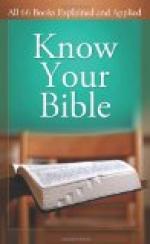Song of Solomon.
Name. Song of Songs which is Solomon’s. It is also called Canticles, meaning Song of Songs and is so-called, perhaps, because of its very great beauty.
The Subject. The subject is faithful love, seen in a woman who though subjected to the temptations of an oriental court, remains faithful to her old lover. She, a country girl of the north, attracts the attention of the king who brings her to Jerusalem and offers her every inducement to become the wife of the king. But upon final refusal she is allowed to return home to her lover, a country shepherd lad.
Meaning of the Story. (1) To the Jews of that time it was a call to purity of life, for a return to those relations which God had ordained between man and woman. It was a protest against polygamy which had become almost universal. Indeed, they regarded it as setting forth the whole history of Israel. (2) To the Christian it sets forth in allegory, Christ and his church as Bridegroom and Bride and the fullness of love which unites the believer and his Savior. (3) To all the world there is shown the purity and constancy of a woman’s love and devotion to her ideals. It furnishes ideal which, if properly held up, would cast out of human society all those monstrous practices that come from unworthy ideals.
The Style. It is part dialogue and part monologue. Their love on both sides is expressed in that sensuous way common among the oriental peoples. Many of the allusions give rise to the belief that it was written to celebrate the nuptials of Solomon and the daughter of Pharaoh.
Analysis.
I. The King’s first attempt to win the Virgin’s love. 1:1-2:7.
1. She converses with the ladies of the court, 1:1-8.
2. The King’s first attempt fails to win her, 1:9-2:7.
II. The King’s second effort to win her love, 2:8-5:8.
1. The virgin recalls her former happiness when with her lover at home, 2:8-17.
2. In a dream she goes in search of him, 3:1-5.
3. The King shows her his glory and greatness, 3:6-11.
4. She again rejects his love in spite of his praise of her beauty, 4:1-7.
5. She longs for her absent lover, 4:8-5:1.
6. She dreams of seeking in vain for him, 5:2-8.
III. The King’s third attempt to win her, 5:9-8:4.
1. The ladies of the court cannot understand her faithfulness to her old lover. 5:9-6:3.
2. The King’s third effort to win her is met with the declaration of her purpose to remain true to her absent lover, 6:4-8:4.
VI. The Triumph of the Maiden, 8:5-14. She returns to her home among the hills of the north and is reunited with her shepherd lover.
For Study and Discussion. (1) Make a list of the passages by which the woman’s beauty is described. (2) Passages that suggest the relation of the saved soul to Christ. (3) Passages that suggest the glory of the church. (4) Some of the passages by which the love of the woman and of the king is expressed. (5) The basis of human love. 2:2-3. (6) The strength of human lover, 8:6-7. (7) The interpretation of human love in terms of divine love.




